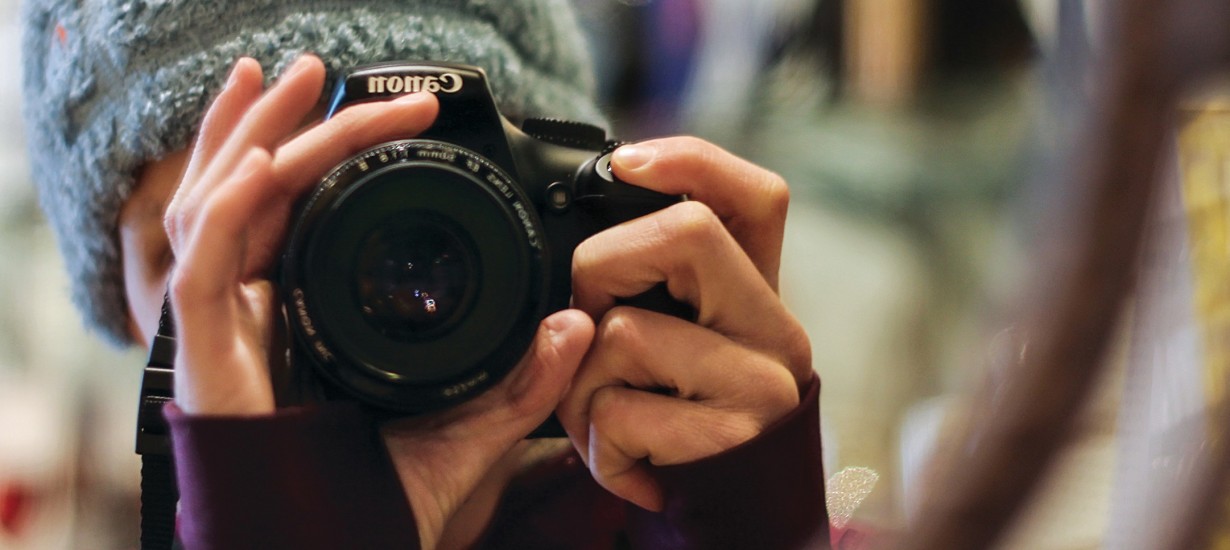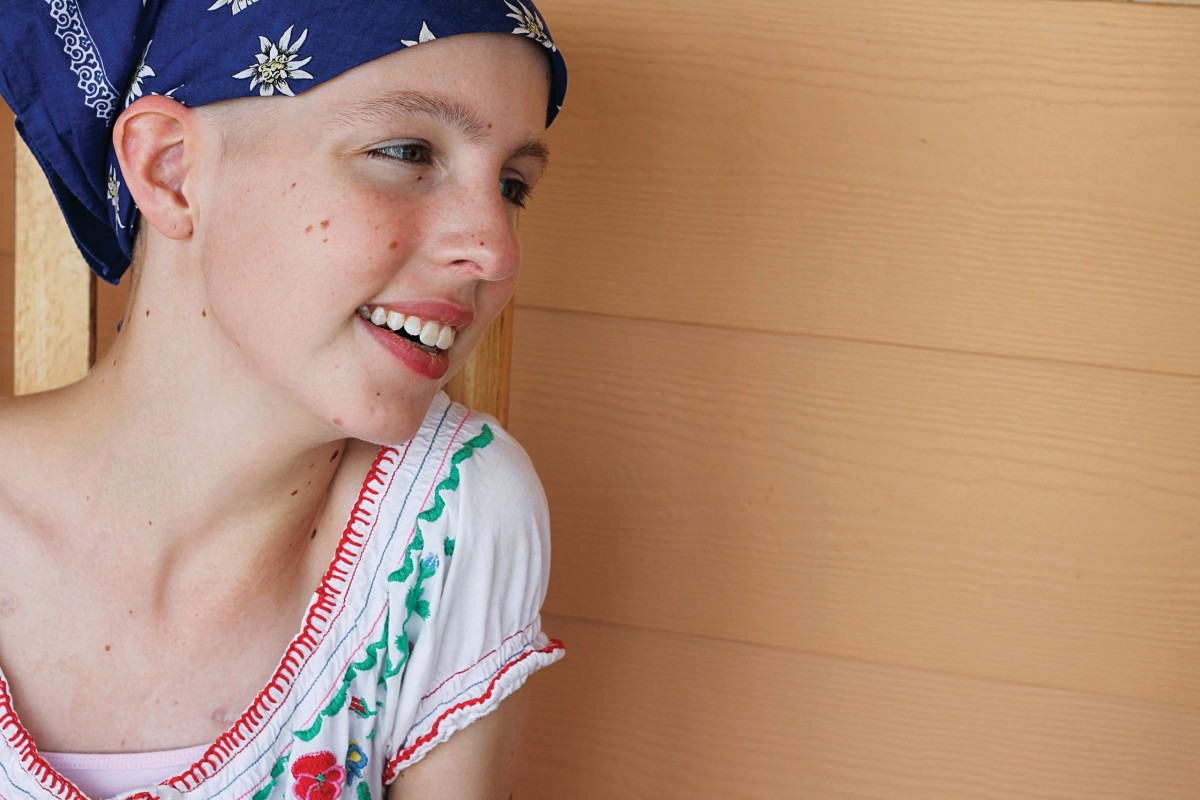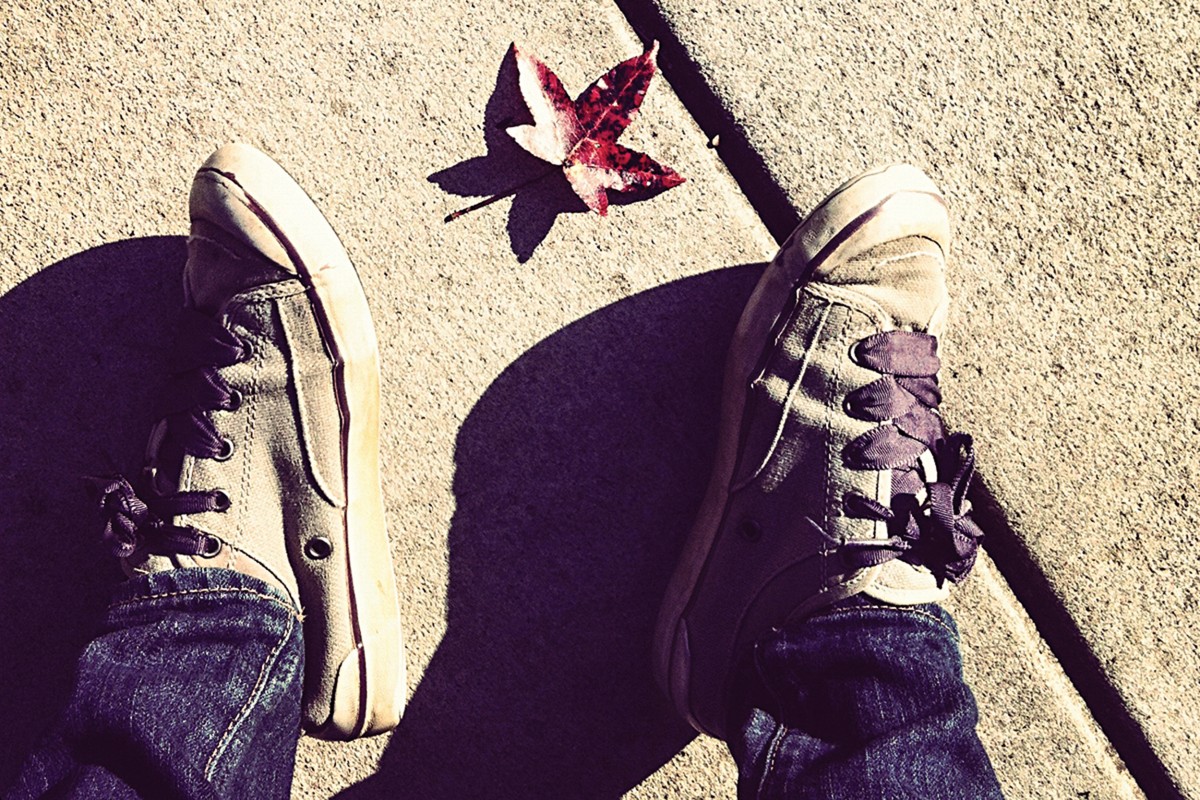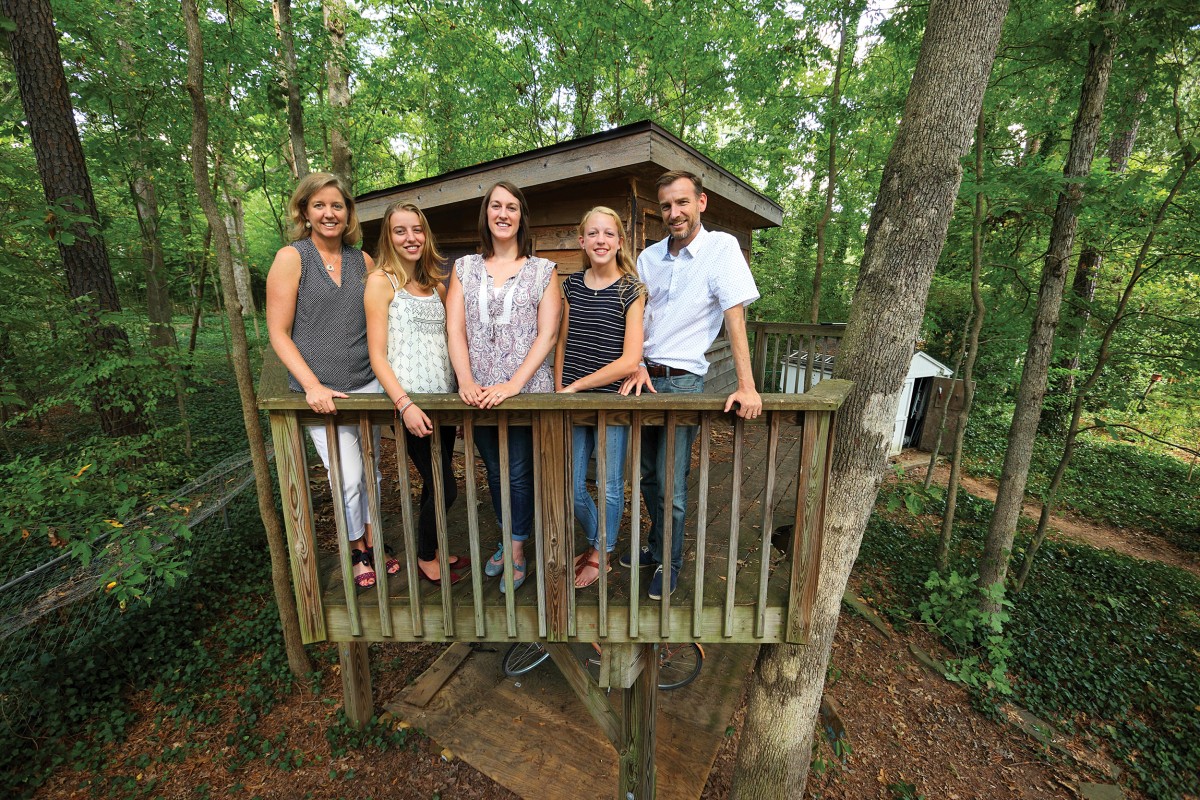She Taught Us What Loud Means

Nobody could say no to Sophie Steiner — especially after her departure, as UNC Hospitals filled the void with a new kind of advocate for teen and young adult cancer patients.
by Mark Derewicz
The nurse loved Sophie’s positivity, her humor, her playful maturity. When Sophie — frail and immune-compromised — sank into sadness alone in a hospital room restricted from other patients, the nurse decided she had to act.
“Sophie, I’m breaking you out of here,” the nurse whispered. “You ready?”
Sophie Steiner, age 15, looked up. The light in her eye returned. The nurse said, “Let’s go!” She wheeled Sophie to an elevator and down three floors to an empty corridor full of windows. Light flooded the space, and Sophie grinned, closed her eyes and let sunlight warm her face.
She was so tired. The chemo. The surgeries. The tests. The tumors. But Sophie got out of the wheelchair, and — with an IV dripping fluids into her veins, she raised her arms in a ballet pose and began to dance.
And she danced. By herself in the silence of that hospital corridor, she danced. In that moment, Sophie was not a cancer patient. She was, simply, Sophie.

Sophie Steiner (Photo courtesy of the Be Loud! Sophie Foundation)
Teens can feel trapped
Authenticity. That’s what cancer can strip from a young life. Sophie Steiner never let cancer take it. She fought to make sure her disease didn’t define her. Yet she couldn’t have done it alone. Her father, Niklaus A. Steiner ’88, director of UNC’s Center for Global Initiatives, could run to the hospital on a moment’s notice. Lucy M. Steiner ’88, an education policy consultant, could be at her daughter’s bedside day and night. They live a short drive from the hospital. They brought Sophie her favorite food, her favorite projects, her favorite people. Sophie’s sisters, Elsa and Annabel, watched movies with her. There were marshmallow wars, fits of laughter, streams of friends. None of this could make the cancer go away, but it lifted Sophie’s spirit in ways that transcended medicine.
Most of the teen and young adult cancer patients at UNC are not from Chapel Hill; their dance instructors can’t just pop over for a session. Their friends, parents and siblings aren’t wired into the Chapel Hill community as the Steiners are.
These teens seem trapped, in a way, in rooms with televisions and cellphones but too little of the stuff that makes life truly rich — people, inspiration, love, laughter and the things we cherish but too often can’t experience during monthlong stretches in the hospital.
More than that, Sophie saw hospital workers wheel in carts full of games and puzzles, coloring books and toy firetrucks — stuff young kids love but which teens might find annoying. Sophie saw this disconnect as an opportunity.
“Could you guys think about helping the older kids in here?” Sophie asked her parents. “Like, raise some gas money for them so they can have more visitors or something? You could put on a fundraiser, show my favorite documentary.”
Niklaus and Lucy told Sophie they would. Two years later, the Steiner family has accomplished much more than raising gas money. Through their Be Loud! Sophie Foundation, and with a lot of help from the Carolina and Chapel Hill communities, they’ve raised hundreds of thousands of dollars and inspired UNC’s Lineberger Comprehensive Cancer Center to create a new kind of position — a full-time, fully funded adolescent and young adult liaison whose main purpose is to befriend cancer patients from 13 to 26 and help them continue to live their lives on their unique terms. What that will look like will depend on each patient. But it’s part of a national movement to better address the particular concerns of teen and young adult cancer patients. UNC is now among the leaders.
“We’re in uncharted waters,” said Dr. Don Rosenstein, who is director of the Comprehensive Cancer Support Program and oversees a variety of services at the hospital. “This is an extraordinary gift the Steiners have made possible. We now have the unprecedented opportunity to designate one person to get to know a teen or young adult patient to figure out what would make their experience with cancer less awful — sometimes a lot less awful — to truly know who this person is, what drives them, what they like or don’t like, what they need and what they don’t know that’s out there, whether it’s a service we provide or a visit from a UNC basketball player or someone from the UNC music department or whatever it might be.”
Ned Sharpless ’88 (’93 MD), Lineberger’s director, has known the Steiners since he and Lucy were Morehead Scholars together as undergraduates. “Lucy is a force of nature,” Sharpless said. “I haven’t been at all surprised by their incredible progress in getting the message out about adolescent and young adult cancers and in raising funds.
“Keeping your normal existence going while getting treated for cancer is very challenging for anyone and particularly hard for adolescents and young adults, some of whom might not have much support from parents or might not want much support from parents. So our belief is that more people working in Don’s group to help these patients will improve their quality of life during therapy and their outcomes from therapy.”
Rosenstein, who also is a professor of psychiatry, hopes this liaison also will help break down the social barriers that too often keep younger patients from participating in potentially lifesaving clinical trials. This would be no small accomplishment. Cancer survival rates for teens and young adults have not improved in the past 25 years, in part because it’s more difficult to enroll them in clinical trials. An adolescent and young adult liaison wouldn’t completely solve this problem, Rosenstein said, but he believes the person in this position could help families figure out the logistics so more kids could participate.
There was no clinical trial to help Sophie. Her cancer was too rare and too far along. But her attitude — positive but blunt — has inspired nurses, doctors, administrators, friends and family to take her concerns to heart. Teens aren’t like 6-year-olds or 60-year-olds when healthy, she told her parents. Throw in a life-threatening disease, and the differences are only magnified.
A ‘procedure chair’?
Sophie, a world traveler thanks to her parents, had a distinct way about her that made everyone in the hospital want to be around her. It’s only fitting that her story has rallied the community to address the distinct struggles of teens and young adults with cancer.
“Sophie could’ve been the most sick kid I took care of,” said nurse Allyson Adamo ’05, “but she was the easiest to take care of. I was in awe of how she took in everything thrown at her with a calmness and strength. She had genuine care for people. She would ask me about my day and my kids and really listen. I have to say this: It felt therapeutic for me as a nurse to go into Sophie’s room. And, of course, there was her sense of humor that isn’t so common in such circumstances.”
There’s a chair in which every pediatric oncology patient sits when waiting to undergo a procedure. It’s called the procedure chair, and it was a name that Sophie didn’t take kindly to.
“Are you kidding me?” she’d tell the nurse. “You gotta come up with a better name. How about the ‘you’re going to feel better chair.’ Or the ‘it has to happen chair.’ But let’s forget about calling it the ‘procedure chair,’ OK?”
Fighting for her life and about to undergo another uncomfortable procedure, Sophie made the nurses laugh.
Her primary doctor, Ian Davis, said Sophie would be sure to clue him in to all the scuttlebutt on her floor “or something she heard about the Royal Family. She did it in such a humorous way that you couldn’t help but love it. She had such a positive attitude. She made all of us smile and laugh and just love to be around her.”
But she wasn’t a saint, which is another thing that people loved about Sophie.
“She wasn’t the best student; her teachers could get frustrated with her, and she could be a little too blunt,” her father said. “And, honestly, she was known in the family to be a bit of a whiner. But from the moment she was diagnosed, she never complained about it. She just took it on. She showed real spirit. And she was brave.”
Be Loud
In early October 2012, about halfway through the field hockey season at East Chapel Hill High School, Sophie felt strange aches and pains in her shoulders. Her belly was distended. Clothes didn’t fit right.
The Steiners took her to Dr. Kelly Fedoriw at UNC Family Medicine. A general examination offered no clues. X-rays showed nothing. Fedoriw ordered a CAT scan.
It was cancer. Sophie’s stomach and liver were riddled with tumors.



Sophie Steiner enjoyed taking photos such as these that were subtle and narrow in focus. She taped dozens of them to her hospital room wall. To see more of Sophie’s photos, go to beloudsophie.org/sophies-photos.
At the same time Fedoriw was telling the Steiners the bad news, Ian Davis was poring over Sophie’s CT scans. The next day, after a biopsy, Davis suspected germ cell cancer, but the cells didn’t respond to the standard staining techniques that typically reveal the cancer type and suggest a course of treatment.
Frustrated, Davis spent hours studying Sophie’s cells through a microscope and consulting with pathologists and fellow researchers across the country. In the end, everyone agreed Sophie had a rare and aggressive kind of germ cell cancer.
After four rounds of chemo, the tumors shrank. After another two rounds, the tumors no longer responded to therapy. This was early in 2013.
On her blog, she wrote:
“I don’t want you to feel sorry for me. I want you to encourage me to keep going. Just to be there when I need you. You can feel bad for me; just don’t show it. Because that’s not gonna help me feel any better. I need people to be strong with me because for me, that is the only way that we are all going to fight this battle together.”
Sophie sensed she might die. She resolved to do everything she could to live as full on as she always had, as a poem she penned a year before her diagnosis suggested. It read, in part:
Be Loud
And move with grace
Explode with light
Have no fear
When Sophie wasn’t feeling great, she refused to abandon ballet practice. When she was too sick to leave the hospital, her dance teacher brought ballet shoes so Sophie could go up on pointe and dance. It was an achievement that took years to accomplish. Cancer couldn’t take that from her.
When there was one kind of food Sophie could stomach, she didn’t hesitate to tell someone. Usually, her parents would grab it. On occasion, Dr. Stuart Gold, head of pediatric oncology, would make sure the special food made it to Sophie’s room.
Sophie loved photography, and she taped dozens of photos to her hospital room wall. Doctors would notice, and Sophie would wryly say, “You haven’t been there, have you, doc?”
On her 15th birthday, thanks to one of Niklaus’ former students, Mackenzie Thomas ’13, a bunch of UNC field hockey players surprised Sophie with home and away jerseys with her name on the backs. Sophie was floored. Not long after this, she realized not many kids in the cancer ward experienced visits like that. And her question was simple: “Why not?”
Cancer is always horrible, but being a teenager with cancer is a particular kind of horribleness. It’s an awkward time. Hormones are raging. You’re trying to figure out who you are, and then, all of a sudden, a life-threatening disease tries to decide that for you. Your parents are heartbroken right there in front of you. And they are your parents; sometimes you don’t want them around. The walls can close in. But there’s nowhere to go.
Caroline Braswell ’03 (’08 BSN), one of Sophie’s nurses, noticed this happening with Sophie. Between shifts, Braswell volunteered to take her for a walk to Starbucks in the N.C. Cancer Hospital.
“By this time, she was really sick, and she looked it,” Braswell said. “I noticed people staring at her. I asked, ‘Does that bother you?’ I expected her to be a little introspective. But instead Sophie said, ‘Nah, it doesn’t bother me. They all have their own problems probably worse than mine. And most of them are more ugly than me anyway.’ ”
Braswell belly-laughed; the people were now staring at her.
Not long after that walk, on Aug. 29, Stuart Gold noticed that Sophie had taken a dramatic turn for the worse. That day and night, a stream of visitors, including surgeons and doctors and nurses who had befriended Sophie, paid their respects to her. The next morning, Sophie died at home surrounded by family.
A week later, at a memorial service nearly 1,000 people strong, family friend Paul Youngman ’95 (MA, ’03 PhD) said, without a trace of sentimentality, “Sophie’s life was too short, but it was a success.”
As fate would have it, Sophie’s life would continue to be a success.

Lauren Lux, center, UNC’s new cancer patient advocate for teens and young adults, says helping balance a patient’s medical and other needs is “exactly what I wanted to be doing with my life.” She’s with, left to right, Lucy Steiner ’88, Elsa Steiner, Annabel Steiner and Niklaus Steiner ’88. (Photo by Jonathan Drake/jonathandrake.smugmug.com/browse)
A fund, but what kind?
At the end of the obituary was the sentence: “In lieu of flowers, please consider making a donation to the Sophie Steiner Fund.” But the Steiner family didn’t really know what that fund would be.
“We figured we would raise maybe $5,000 or $10,000 and buy gas cards for parents Down East who had to travel so far to the hospital,” Niklaus said. “We honestly didn’t know.”
Within a few weeks, donations topped $10,000. By the end of 2013, the Sophie Fund neared $70,000. “That’s when we thought this wouldn’t be just a little fund,” Niklaus said. “We decided to start a foundation that could make systemic changes to the way we support teen and young adult cancer patients.”
The family named it the Be Loud! Sophie Foundation, as if Sophie were shouting the first lines of her poem. The foundation’s first event was showing her favorite documentary, Hava Nagila, which was co-produced by her namesake and family friend Sophie Sartain ’88. The night at the Varsity Theatre raised $5,000.
Soon, the Be Loud! Sophie Foundation had raised nearly $100,000.
“We thought about what Sophie would want us to do with this money,” Niklaus said. “And that’s when we realized we could create an advocate position at the hospital, someone who could befriend teens and young adults and help them navigate these incredibly difficult situations.”
Lucy said: “We looked at other hospitals to find a model for this position. But we couldn’t find anything like it, nothing for this particular age group of 13 to 26.”
They learned of Teen Cancer America, an organization dedicated to transforming cancer care for teens and young adults. Hilary Gan, the director of the organization’s hospital programs and services who led UCLA’s creation of its teen and young adult support program, consulted with UNC on the writing of Lineberger’s job description.
“There are so many aspects of a good program, but being able to connect with young people is key,” Gan said. “I think it’s amazing that UNC will have a dedicated person 100 percent focused on the needs of this patient population. It’s the first such position I’m aware of. It’s just fantastic that UNC saw the value in this and made it happen.”
The Steiner family could do so much for Sophie because they know so many people in Chapel Hill and at the University.
“But what about the 16-year-old from New Bern whose parents can’t take off work, don’t know anyone in Chapel Hill and can’t get friends or coaches or teachers to visit?” Niklaus said. “What if that kid is shy, unlike Sophie, and doesn’t think to ask for what might help? And the truth is there were things we couldn’t do for Sophie that would have helped her.”
For instance, Sophie had more visitors than other patients, but she still was bored. One thing that might have helped was getting to know other patients like her. Yet, because of federal health privacy regulations, doctors and nurses couldn’t let Sophie know that down the hall there was a patient she might like to meet. This new advocate would bridge that kind of gap, perhaps even help group teen patients together.
Stuart Gold and Ian Davis immediately saw the potential benefit, and Gold suggested that the Steiners meet with Rosenstein, who had been recruited to UNC to transform the hospital’s cancer support efforts.
“I admit, when I first met the Steiners, I thought they were really nice people with a good idea, but our group was already so busy and stretched too thin,” Rosenstein said. “Yet, the more we met, the more impressed I became. They were so passionate and enthusiastic, and I realized that this position really could fill a gap in cancer support services.”
The problem was money.
“Our cancer support program already offers so many things — yoga, massage, acupuncture, mental health care, survivorship programs, pain and side-effect management,” Rosenstein said. “And just about all of it loses money for the hospital.”
The Steiners resolved to raise the money through the foundation. They formed a board of directors that now includes Davis, Gold and former UNC basketball star Eric Montross ’94 and his wife, Laura Montross ’93.
Music to their ears
Niklaus and Lucy then wondered how Sophie would like them to raise money. Music, they thought. Community. Friends. Celebrations.
Niklaus reunited with friends from high school and college, including John Plymale from the 1980s band The Pressure Boys. Plymale agreed to get the band back together for a benefit concert. Once the Pressure Boys signed on, word spread, and other bands from the golden age of Chapel Hill’s music scene agreed to join the reunion. The Connells and the Dexter Romweber Duo joined the ticket. Mitch Easter ’77 even got Let’s Active back together.
Frank Heath ’86 offered Cat’s Cradle free of charge for two weekend nights in August 2014. Both nights sold out, and over just those two days, the foundation raised another $45,000.
“I could not believe how this all came together,” Niklaus said. “It was exactly what Sophie would’ve wanted, and it was an incredible weekend.”
Friends warned the Steiners not to do too many benefit concerts. So they found other ways to raise money. Friends (and some strangers) put together a string of smaller benefits — relay races, bake sales, dance performances, student concerts.
Tift Merritt ’00 and Don Dixon ’73 joined the Red Clay Ramblers at a dinner that raised another $35,000.
This past summer, seven local Boy Scouts biked across the country — they called it Bike Loud — to honor Sophie and raise awareness of teen cancer issues.
Now Rosenstein was ready to push the position through human resources. The foundation seeded it with $100,000 to Lineberger. In August, the hiring process was complete.
Lauren Lux is trained as a clinical social worker. She previously worked at the University of Illinois-Chicago Medical Center, Duke University and the Center for Child and Family Health, a collaboration among Duke, UNC and N.C. Central University.
“When a friend showed me the job description, I couldn’t believe it because this position was exactly what I wanted to be doing with my life,” Lux said. “At a time when teens and young adults are becoming who they are, this very traumatic, horrible thing happens, and it gets folded into their narrative. I love this age group.”
Part of her job will be to figure out how to balance the medical needs with other needs the patient might have. For instance, if there’s a teen who’s been isolated because she had a stem cell transplant, developmentally that isolation might not be appropriate.
Lux said some hospital personnel are naturals at working with different groups of patients. Others might require training to work better with adolescent and young adult patients. “Not everyone has to be great with teens or young adults, but I’ve found that this patient population can be a real question mark for health care providers, and we need to address that.”
Lucy and Niklaus Steiner are in awe of the ways Carolina, UNC Health Care and the Chapel Hill community have rallied to their aid.
Niklaus said: “One reason why we care so much about this is that Sophie’s care at UNC was absolutely phenomenal. We’re so grateful for all that the hospital did. For some reason, what we’re trying to accomplish has resonated within this community.
“People have said to me that they don’t know if they’d be able to handle living in the same place where something awful like losing a child had happened. I understand that. I really do. But nothing would seem more alien to me than moving away and starting all over again. Because a big part of what’s sustained us is this community and all the ties we have here. I couldn’t dream of not being part of it.”
Mark Derewicz is a freelance writer and the science communications manager for UNC’s School of Medicine.
Thanks for reading the Carolina Alumni Review
Carolina Alumni members, sign in to continue reading.
Not yet a member? Become one today.
